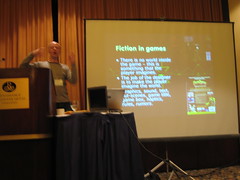Half-Real: The Interplay between Game Rules and Game Fiction;
Jesper Juul
Jesper Juul prefers the term “fiction” rather than “narrative”, arguing that the world only exists in the player’s head anyway, at least if it’s not a reality-game. Juul sees fiction as a help to the player to understand the rules about the game. After some time of playing the player learns to ignore the fiction. If something doesn’t make sense in the fiction of the game “it is just the rules”. This would according to Jesper explain the lack of role-playing in MMORPGs, since the fiction would be ignored in order to optimise the game play according to the rules of the game. He quoted Haider & Frensch (1996) when mentioning information reduction, and said “Games are half-real”.
I appreciate Jesper’s point about fiction vs. rules. It is a good distinction to make, and I agree that it is a help to the player in the beginning, and that it gets less important as the player start playing by the rules instead of by the underlying mechanics implied by the fiction. In my world though I just see the fiction as the back-story and nature of the world. Terms like diegesis and ontology come to mind. The actual narrative of MMORPGs are built at so many different levels and the fiction that Jesper is addressing I would place, in terms of creators; in the hands of the developer’s, and in terms of the overall text of a MMORPG id place in the box of “designed narrative potential”. The actual narratives from developers occur, but players create the mass of narrative. I don’t think we can ignore the term narrative when it comes to games, but we need to apply it in a way that is practical. Sorry if got you wrong Jesper, you can just slap me next time we meet :)
http://www.gamesconference.org/digra2005/viewabstract.php?id=264
